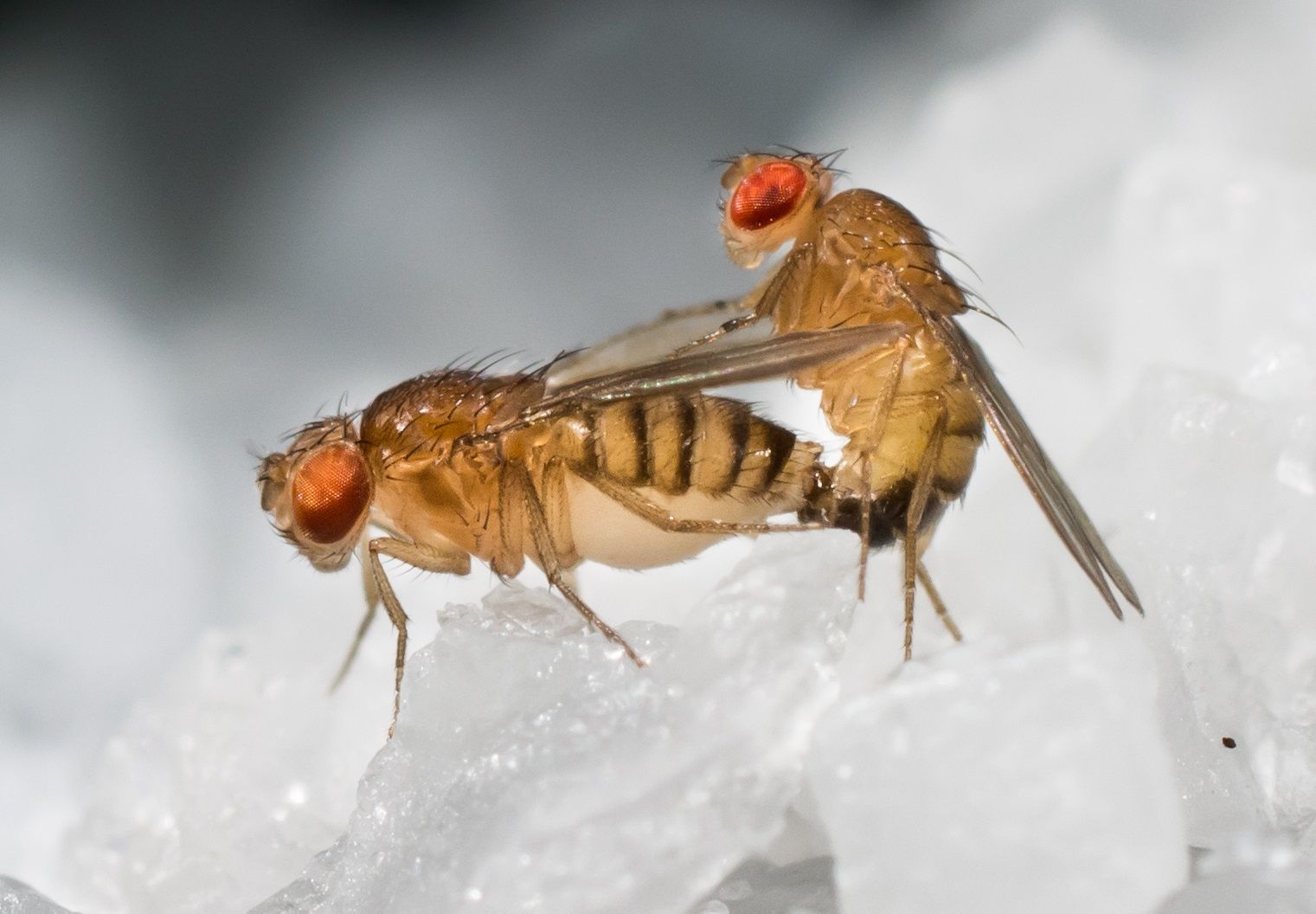
Sperm turns female fruit flies into crazed aggressors after sex, making them head-butt and kick virgin fruit flies to get more food. Scientists discovered a specific peptide in fruit fly seminal fluid is directly involved in the observed behavior changes seen in fruit flies after sex, and they say the findings could have implications for mammal behavior—potentially even for humans.
Sex, pregnancy and rearing offspring is known to lead to heightened aggression among the females of many species— a bear with cubs, for example, is particularly dangerous, especially if she feels threatened. Among meerkats, the alpha female will kill the offspring of her subordinates and exile the offending party.
Scientists have known for over 100 years that the female fruit fly Drosophila melanogaster is hyper aggressive after sex. But the reason why has been a longstanding mystery. In a study published in Nature Ecology & Evolution, researchers have now looked at what it is about sex that makes the female of the species so angry.
The team, led by Eleanor Bath, from the University of Oxford, U.K., created mutant fruit flies so they had females that did not produce eggs and males that produced no sperm. These were then placed with normal fruit flies.
Pairs of females were placed into chambers where there were limited food resources. This acted as a catalyst for aggression. They then documented the level of aggression seen between two virgins, a virgin and a fruit fly post sex, then two fruit flies that had recently mated.
Aggression levels were clearly higher when a female that had recently mated was in the chamber. Lead author Eleanor Bath tells Newsweek : "The most escalated form is where females will head-butt each other. They'll go for the other female's head or side, attacking from side on—trying to push her off the food. They also do a thing called fencing, where they sort of wave their legs at each other, like when someone imitates a cat fight—it looks a little bit like that."
Next, the team worked out what it was about sex that caused this behavior. Their findings showed a peptide in sperm triggers aggression in females, sending them chemical messages telling them to compete harder with other females: "Essentially what we think is happening is females get more aggressive so they can get more food, particularly high value nutrients like protein," Bath says.
"Because flies need a lot of protein to produce eggs, our idea is that females fight to get more protein—and those that get more protein are able to produce more eggs, or they are able to get better spots to lay their eggs. That means they should have more offspring hatch," Bath adds.
The team is currently considering the possibility the aggression is triggered by the male so he can protect his own offspring—regardless of the female's wellbeing. "It's the assumption we're working on at the moment," says Bath. "I view it in two possible ways. One is that it benefits females to become more aggressive and they use sperm and seminal fluid proteins a sort of cue to say 'it's time for me to get aggressive now.'
"The other way is maybe it's not entirely in the female's best interests to become aggressive every time she mates—but it is in the male's interest. So he is sending these proteins and cues to the female to make her more aggressive for the benefit of his offspring."
Females, Bath notes, do not appear to be aggressive to males after mating. But this is because they are not competing for food: "Normally, the males aren't trying to eat the food. Normally they're trying to mate with the females. They've got a very one-track mind. The females will kick them away to try to stop the males from mating them. I don't know if they use the same aggressive behavior to males though."
But what does it all mean? Fruit flies serve as a good model organism for understanding the molecular mechanisms behind many human diseases—around 75 percent of disease-causing genes are found in the species in a similar form.
For this reason, the authors argue a similar process could be taking place in mammals. "It's a bit [of a] jump from flies to humans, but it's possible that something like this happens in mammals and humans," Bath says. "Mammals and humans also have seminal fluid proteins that induce changes in female behavior and physiology. There's one that induces ovulation and you find it in llamas and koalas and humans, and a lot of mammals get aggressive when they have offspring or are pregnant, for example.
"But we don't know. No one has really looked at—whether the act of mating itself is what induces any female aggression."
Next, the researchers hope to work out if the aggressive behavior is beneficial to females or whether males induce it to serve their own purpose: "That's something we're working on now. We're hoping to make super aggressive flies and flies that aren't aggressive to test that directly," she says, adding eventually they hope to expand this research into other animals.
Uncommon Knowledge
Newsweek is committed to challenging conventional wisdom and finding connections in the search for common ground.
Newsweek is committed to challenging conventional wisdom and finding connections in the search for common ground.
About the writer
Hannah Osborne is Nesweek's Science Editor, based in London, UK. Hannah joined Newsweek in 2017 from IBTimes UK. She is ... Read more
To read how Newsweek uses AI as a newsroom tool, Click here.








